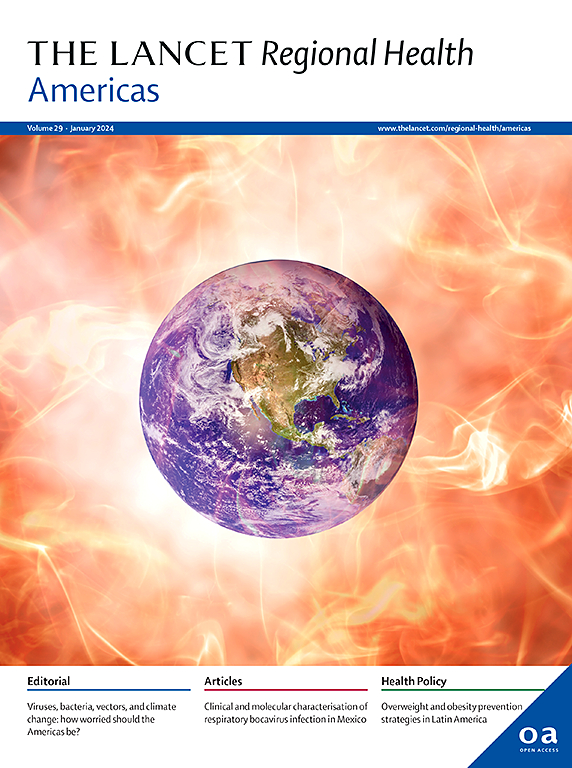Genetic characterization of Plasmodium vivax linked to autochthonous malaria transmission in the US (2023) using Illumina AmpliSeq technology: a genetic epidemiology study
IF 7
Q1 HEALTH CARE SCIENCES & SERVICES
引用次数: 0
Abstract
Background
Malaria is a mosquito borne disease caused by parasites of the genus Plasmodium. In 2023, the United States (US) experienced nine cases of autochthonous Plasmodium vivax malaria transmission; seven in Florida, one in Texas, and another in Arkansas. These were the first autochthonous cases since 2003 when a cluster was identified in Florida. The aim of this study was to genetically characterize the implicated P. vivax isolates in order to complement epidemiologic investigations of these cases.
Methods
A custom Illumina AmpliSeq sequencing panel capturing 495 amplicons was designed. This panel was used to ascertain whether these 2023 cases were related, and assess if they were associated with a single or separate introduction events. Sequence data were hierarchically clustered and a Naïve Bayes classification approach was used to assign genotypes to a probable geographic origin based on 113 ‘geo-informative’ SNPs captured by the panel. Genotypes associated with the 2023 Arkansas, Texas, and Florida cases were clustered alongside those sequenced from archived blood samples from the 2003 Florida case-patients, a set of reference strains, and other travel-associated specimens. Microsatellite analysis was performed on a subset of samples from these autochthonous cases to complement the AmpliSeq analysis.
Findings
The 2023 autochthonous Florida cases were genetically linked as were the 2003 Florida cases. The 2023 and 2003 Florida clusters were genetically distinct, and the two Florida clusters were distinct from the 2023 Texas and Arkansas cases, which were also distinct from each other. These genotypes classified to the Central or South American region using the Naïve Bayes classifier, including those from the 2003 cluster.
Interpretation
These data support that at least three distinct P. vivax introduction events in the US in 2023, involving parasites possessing genetic signatures consistent with Central or South America.
Funding
This work was supported by the National Center for Emerging and Zoonotic Infectious Diseases at the US Centers for Disease Control and Prevention.
利用Illumina AmpliSeq技术对美国(2023年)与本地疟疾传播相关的间日疟原虫进行遗传表征:一项遗传流行病学研究
疟疾是一种由疟原虫属寄生虫引起的蚊媒疾病。2023年,美国出现了9例本土间日疟原虫疟疾传播病例;佛罗里达州7个,德克萨斯州1个,阿肯色州1个。这是自2003年在佛罗里达州发现聚集性病例以来的首次本土病例。本研究的目的是对间日疟原虫分离株进行遗传表征,以补充这些病例的流行病学调查。方法设计包含495个扩增子的定制Illumina AmpliSeq测序板。该小组用于确定这2023例病例是否相关,并评估它们是否与单个或单独的引入事件有关。序列数据分层聚类,并使用Naïve贝叶斯分类方法根据小组捕获的113个“地理信息”snp将基因型分配到可能的地理起源。与2023年阿肯色州、德克萨斯州和佛罗里达州病例相关的基因型与2003年佛罗里达州病例患者的存档血液样本、一组参考菌株和其他旅行相关标本的基因型聚集在一起。对这些本地病例的一部分样本进行微卫星分析,以补充AmpliSeq分析。发现2023例佛罗里达本土病例与2003年佛罗里达病例具有遗传联系。2023年和2003年佛罗里达的群集在基因上是不同的,佛罗里达的两个群集与2023年德克萨斯州和阿肯色州的病例不同,这两个病例也彼此不同。使用Naïve贝叶斯分类器将这些基因型分类到中美洲或南美洲地区,包括2003年聚类的基因型。这些数据支持2023年美国至少有三次不同的间日疟原虫引入事件,涉及具有与中美洲或南美洲一致的遗传特征的寄生虫。这项工作得到了美国疾病控制和预防中心国家新发和人畜共患传染病中心的支持。
本文章由计算机程序翻译,如有差异,请以英文原文为准。
求助全文
约1分钟内获得全文
求助全文
来源期刊

Lancet Regional Health-Americas
Multiple-
CiteScore
8.00
自引率
0.00%
发文量
0
期刊介绍:
The Lancet Regional Health – Americas, an open-access journal, contributes to The Lancet's global initiative by focusing on health-care quality and access in the Americas. It aims to advance clinical practice and health policy in the region, promoting better health outcomes. The journal publishes high-quality original research advocating change or shedding light on clinical practice and health policy. It welcomes submissions on various regional health topics, including infectious diseases, non-communicable diseases, child and adolescent health, maternal and reproductive health, emergency care, health policy, and health equity.
 求助内容:
求助内容: 应助结果提醒方式:
应助结果提醒方式:


